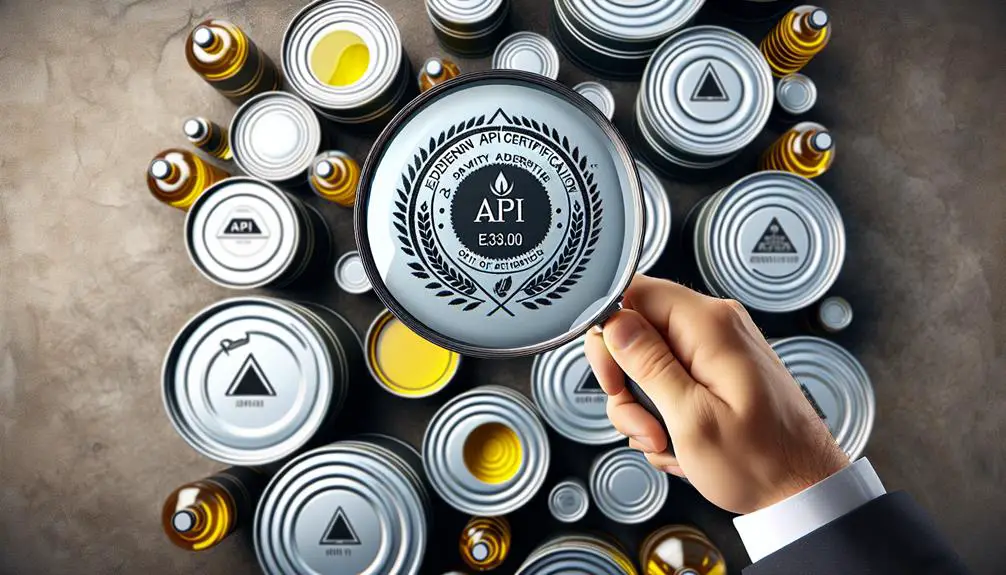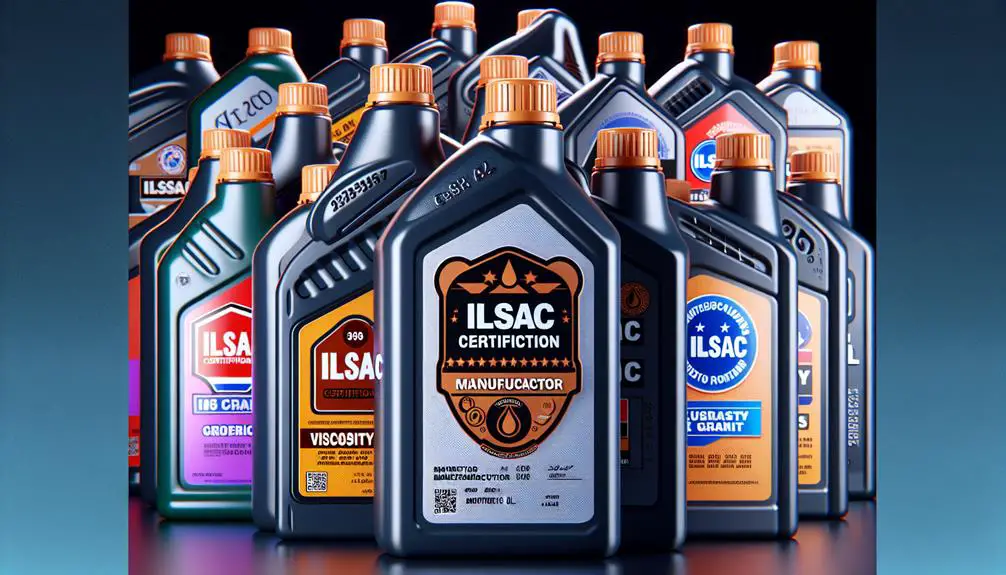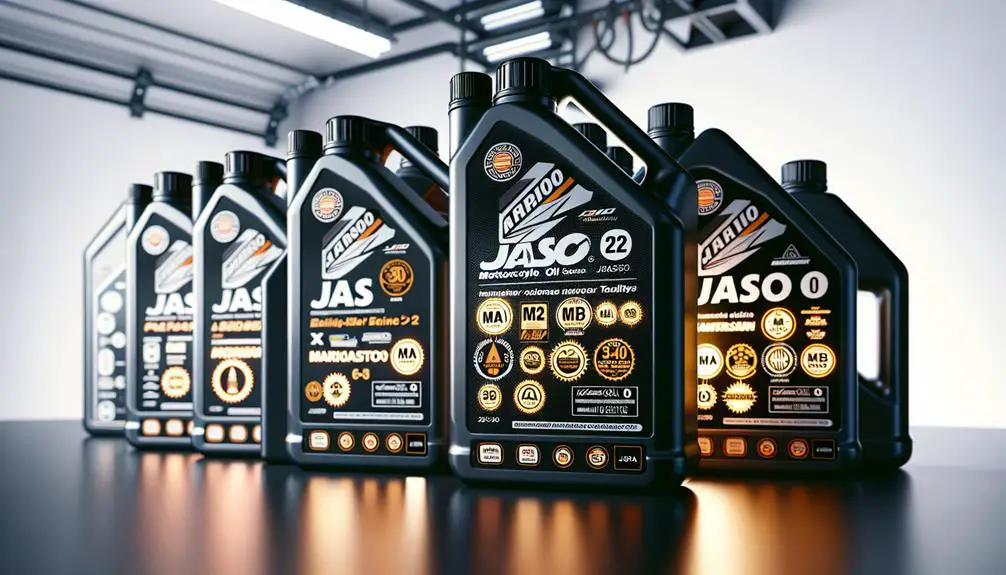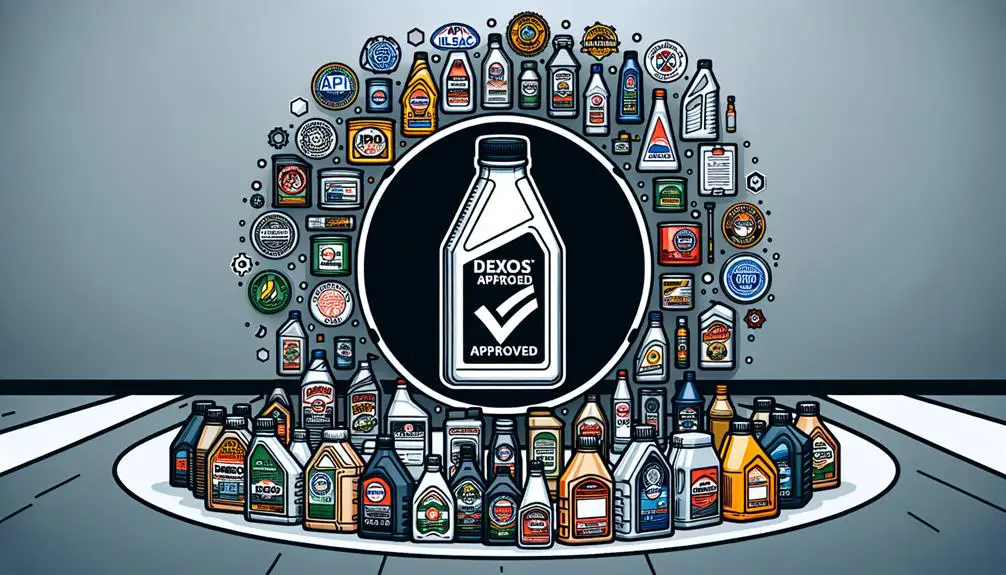Have you ever wondered how much impact manufacturer certifications truly have on the quality of oil you choose for your vehicle? The certifications stamped on oil containers may hold more significance than meets the eye, affecting not just the performance but also the longevity of your engine. These certifications serve as a mark of assurance, setting standards that could make or break your engine's health. But how exactly do these certifications influence oil quality, and what specific benefits do they offer? Let's expose the complexities and highlight the importance of manufacturer certifications in determining the oil you trust to keep your engine running smoothly.
Key Takeaways
- Manufacturer certifications ensure oil quality, performance, and reliability.
- OEM approvals directly impact vehicle performance and longevity.
- Standards like API, ILSAC, ACEA, JASO, SN Plus, and Dexos guarantee engine protection and compatibility.
- Certifications prevent warranty issues, breakdowns, and optimize engine efficiency.
- Complying with certifications saves time, money, and ensures peak engine performance.
Understanding API Certification

To understand API Certification, you need to grasp its significance in determining the quality of oil products. API, or the American Petroleum Institute, sets standards for the performance, quality, and consistency of oils through rigorous testing. When a product carries the API Certification, it means that it meets these stringent requirements, guaranteeing that it will perform effectively in your vehicle's engine.
API Certification is vital for ensuring that the oil you use maintains the proper lubrication, minimizes wear and tear, and maximizes engine performance. Without this certification, you could be risking damage to your engine and potentially incurring costly repairs. By choosing API Certified oils, you can have confidence in the quality and reliability of the product you're using.
In the world of oils, API Certification is like a stamp of approval that signifies you're using a product that has been thoroughly tested and meets the highest standards. So, when selecting your next oil product, remember to look for that API Certification to guarantee you're getting the best quality for your vehicle.
Significance of OEM Approvals
You must understand the significance of OEM approvals when it comes to oil quality.
These approvals demonstrate that the oil meets the specific requirements set by the original equipment manufacturer.
Such certifications have a direct impact on the performance and longevity of your vehicle.
OEM Approval Importance
Understanding the importance of OEM approvals is vital in evaluating the quality and compatibility of oil products for specific machinery and equipment. When a manufacturer approves a particular oil for use in their equipment, it indicates that the oil meets their rigorous standards and specifications. This approval is critical as it guarantees that the oil will provide excellent performance and protection, reducing the risk of breakdowns and extending the lifespan of the machinery.
OEM approvals also give you confidence that the oil has been tested and proven to work effectively in that specific equipment, giving you peace of mind during operation. Using an oil that isn't approved by the original equipment manufacturer can void warranties and lead to potential issues down the line.
Therefore, paying attention to OEM approvals when selecting oil for your machinery is a wise choice that can save you time, money, and headaches in the long run.
Certification Impact
The impact of certifications, particularly OEM approvals, on oil quality can't be overstated. When a manufacturer's oil product receives approval from an Original Equipment Manufacturer (OEM), it signifies that the oil has met stringent quality standards set by the OEM. This approval is more than just a stamp of recognition; it's a confirmation of the oil's ability to perform excellently in specific vehicle engines or machinery.
OEM approvals carry significant weight because they indicate that the oil has undergone testing and meets the requirements for compatibility with particular engine types. By using an oil with OEM approval, you can have confidence that it will provide the necessary protection and performance for your vehicle or equipment. This assurance extends to factors such as lubrication, wear protection, and overall engine cleanliness.
In essence, choosing an oil with OEM approval ensures that you're using a product that has been specifically tailored to meet the needs of your vehicle or machinery, ultimately contributing to enhanced performance and longevity.
Impact of ILSAC Standards

You should consider the Impact of ILSAC Standards to understand their influence on oil quality certifications.
Analyzing how ILSAC standards impact certification processes and the factors that influence these standards can provide valuable insights.
ILSAC Impact Analysis
Analyzing the impact of ILSAC standards on oil quality reveals important insights for manufacturers and consumers alike. ILSAC, or the International Lubricant Standardization and Approval Committee, sets benchmarks for engine oils to meet specific performance requirements. These standards drive manufacturers to formulate oils that enhance engine efficiency, protect against wear, and improve fuel economy. For consumers, ILSAC standards provide assurance that the oil they purchase has been rigorously tested and meets the necessary criteria for best engine performance.
ILSAC standards influence the development of oils that offer better protection against engine deposits and sludge buildup, ensuring longer engine life and improved reliability. Additionally, these standards encourage the use of oils that contribute to lower emissions and reduce environmental impact.
Certification Influence Factors
ILSAC standards shape the formulation and quality of engine oils through specific certification influence factors. When it comes to ILSAC impact on oil quality, factors like viscosity grade requirements, friction modifiers, and additive technology play a significant role.
The certification process guarantees that oils meet the performance standards set by the International Lubricant Standardization and Approval Committee (ILSAC). By adhering to these standards, manufacturers assure that their oils provide excellent protection and performance for your engine.
ILSAC standards also influence the development of oils that deliver fuel efficiency benefits, reduce emissions, and enhance engine durability. The certification requirements push manufacturers to innovate and constantly improve their oil formulations to meet the evolving needs of modern engines.
Additionally, ILSAC standards encourage transparency and accountability in the oil industry, giving consumers peace of mind knowing that certified oils have undergone rigorous testing to meet specific quality benchmarks.
In essence, the influence of ILSAC standards on oil quality underscores the importance of manufacturer certifications in ensuring that you get high-performance engine oils that meet the demands of your vehicle.
European ACEA Specifications
Understanding the European ACEA Specifications is crucial for evaluating the quality of oil products in the automotive industry. These specifications, set by the European Automobile Manufacturers' Association, provide clear guidelines for oil performance levels based on factors like engine type, fuel efficiency, and environmental impact. By familiarizing yourself with the ACEA classifications, you can confidently choose the right oil for your vehicle, ensuring excellent engine protection and performance.
The ACEA specifications are divided into different categories, such as A/B for gasoline engines and C for diesel engines, each with specific requirements that oils must meet to receive certification. This detailed classification system empowers consumers to make informed decisions about which oils best suit their vehicles' needs, without being swayed by misleading marketing tactics.
In essence, embracing the European ACEA Specifications frees you from the uncertainty surrounding oil quality, allowing you to select products that align with your vehicle's requirements and performance expectations. Be empowered by knowledge, and let the ACEA classifications guide you towards the best oil choice for your automotive companion.
JASO Classification for Motorcycle Oils

Discover the JASO Classification system to guarantee you select the right oil for your motorcycle's specific requirements and performance standards. The Japanese Automotive Standards Organization (JASO) has developed this classification to make sure that motorcycle oils meet the necessary standards for different types of bikes.
By understanding the JASO Classification, you can make a well-informed choice when selecting the oil that best suits your motorcycle's engine.
- JASO MA: Designed for wet clutch systems, provides excellent friction performance.
- JASO MB: Formulated for motorcycles with a separate gearbox and clutch, offers lower friction properties.
- JASO MA1: Suitable for engines with a higher degree of friction control.
- JASO MA2: Specifically crafted for modern motorcycles with catalytic converters, ensuring low phosphorus content.
- JASO T903: Focuses on the oil's impact on the environment, including biodegradability and low aquatic toxicity.
Understanding these JASO classifications will help you make a well-informed decision when choosing the right oil for your motorcycle, ensuring top-notch performance and protection.
SN Plus Rating for Modern Engines
Consider the SN Plus rating when selecting oil for modern engines to guarantee peak performance and protection. This rating specifically addresses the challenges faced by newer engines, such as low-speed pre-ignition (LSPI) and timing chain wear. SN Plus oils have enhanced additives to combat these issues, assuring your engine runs smoothly and efficiently.
When you opt for an SN Plus rated oil, you're choosing a product designed to meet the demands of modern engine technology. These oils go through rigorous testing to confirm they provide the necessary protection against LSPI, which can cause engine knocking and damage over time. By selecting an oil with this rating, you're actively safeguarding your engine's longevity and performance.
To maintain your engine's health and keep it running at its best, make sure to check for the SN Plus rating when purchasing oil. This small step can make a significant difference in how your engine performs and how well it's protected against common modern engine issues.
Importance of Dexos Approval

Make sure to prioritize oils with Dexos approval for best performance and protection of your vehicle's engine. Dexos approval indicates that the oil meets stringent requirements set by General Motors to guarantee peak performance and protection for modern engines.
Here are five reasons why choosing oils with Dexos approval is essential:
- Engine Longevity: Dexos-approved oils are formulated to reduce wear and maintain engine cleanliness, ultimately extending the life of your engine.
- Fuel Efficiency: These oils are designed to minimize friction within the engine, leading to improved fuel efficiency and cost savings over time.
- Compatibility: Dexos-approved oils are compatible with the latest engine technologies, including turbochargers and direct injection systems.
- Warranty Compliance: Using Dexos-approved oils may be necessary to maintain your vehicle's warranty coverage, ensuring you adhere to manufacturer recommendations.
- Performance: Oils with Dexos approval are engineered to deliver top performance under various driving conditions, providing peace of mind and reliable engine protection.
Frequently Asked Questions
Are Manufacturer Certifications Necessary for All Types of Vehicles?
Manufacturer certifications are essential for all vehicle types. They guarantee that the products meet quality standards set by the manufacturer.
Without these certifications, you risk using subpar products that could harm your vehicle's performance and longevity. Always look for certifications to guarantee that the oil you choose is compatible and safe for your vehicle.
Be proactive in selecting certified oils for best performance and protection.
How Often Should Oil Quality Certifications Be Renewed?
When it's time to think about renewing oil quality certifications, remember it's like giving your car a fresh breath of life. Keeping up with these renewals guarantees that your engine is running smoothly and efficiently.
Be proactive about this process to maintain peak performance and prolong the life of your vehicle. Stay on top of these certifications to confirm that your oil is of the highest quality and your engine is well taken care of.
Can Using Uncertified Oil Void a Vehicle's Warranty?
Using uncertified oil can potentially void your vehicle's warranty. Manufacturers often specify the type of oil that must be used to maintain the warranty. Failure to comply with these guidelines, such as using uncertified oil, can give the manufacturer grounds to deny warranty claims.
Always make sure to follow the manufacturer's recommendations on oil quality to avoid any warranty issues down the road.
Do All Manufacturers Recognize the Same Certifications?
Understanding manufacturer certifications is crucial because not all manufacturers acknowledge the same certifications. This can affect the quality and compatibility of the oil you use in your vehicle.
Be sure to research which certifications are recognized by your specific manufacturer to prevent any warranty issues in the future.
Stay informed, and you'll have the freedom to choose the best oil for your car without any worries!
What Happens if a Vehicle Uses Oil Without Any Certifications?
If your vehicle uses oil without any certifications, you could be risking engine damage. Without proper certifications, the quality and performance of the oil may not meet the standards required for your engine.
This could lead to increased wear and tear, reduced efficiency, and potential breakdowns. Ensuring that the oil you use carries manufacturer certifications is essential for maintaining the health and longevity of your vehicle's engine.
Conclusion
To sum up, manufacturer certifications are like the road signs that guide your engine oil towards peak performance and longevity.
Just like a well-maintained engine purrs smoothly down a winding road, oils with the right certifications guarantee your engine runs like a well-oiled machine.
So, next time you're choosing an oil, look for those certifications to keep your engine running smoothly and efficiently for miles to come.
